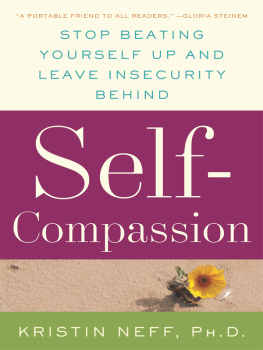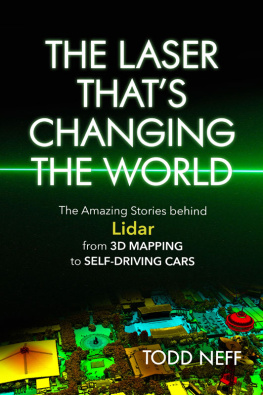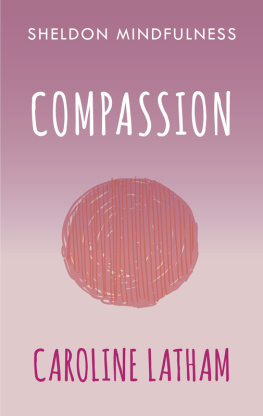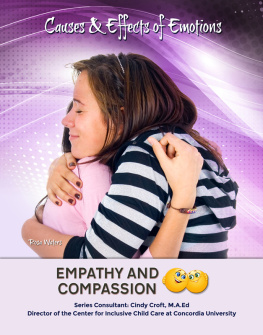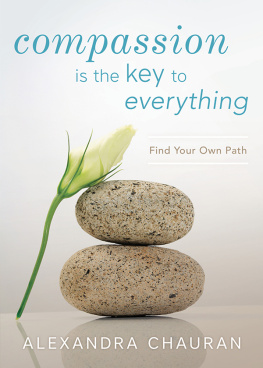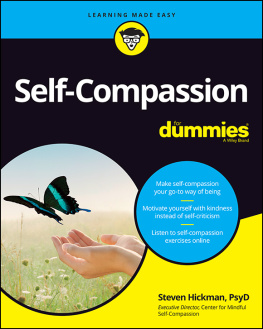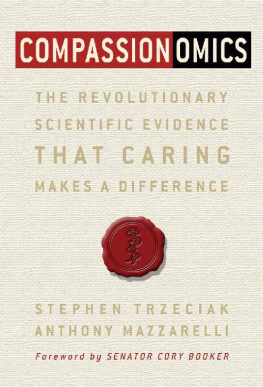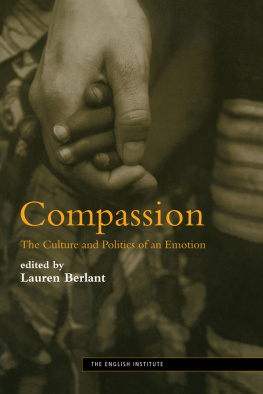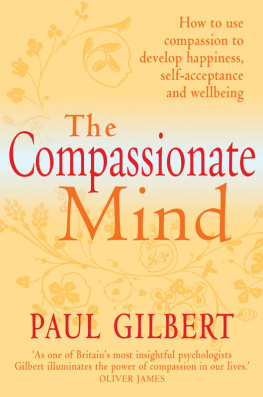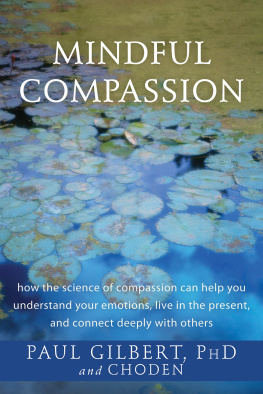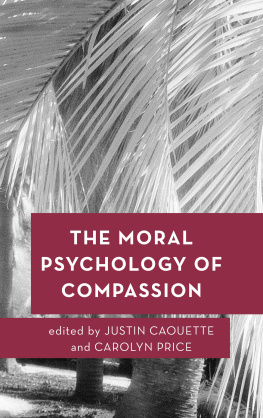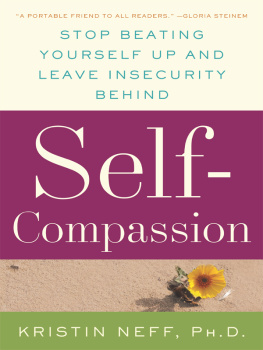DISCOVERING SELF-COMPASSION
This kind of compulsive concern with I, me, and mine isnt the same as loving ourselvesLoving ourselves points us to capacities of resilience, compassion, and understanding within that are simply part of being alive.
S HARON S ALZBERG, The Force of Kindness
I N THIS INCREDIBLY COMPETITIVE SOCIETY OF OURS, HOW MANY OF us truly feel good about ourselves? It seems such a fleeting thingfeeling goodespecially as we need to feel special and above average to feel worthy. Anything less seems like a failure. I remember once as a freshman in college, after spending hours getting ready for a big party, I complained to my boyfriend that my hair, makeup, and outfit were woefully inadequate. He tried to reassure me by saying, Dont worry, you look fine.
Fine? Oh great, I always wanted to look fine
The desire to feel special is understandable. The problem is that by definition, its impossible for everyone to be above average at the same time. Although there are some ways in which we excel, there is always someone smarter, prettier, more successful. How do we cope with this? Not very well. To see ourselves positively, we tend to inflate our own egos and put others down so that we can feel good in comparison. But this strategy comes at a priceit holds us back from reaching our full potential in life.
Distorting Mirrors
If I have to feel better than you to feel good about myself, then how clearly am I really going to see you, or myself for that matter? Lets say I had a stressful day at work and am grumpy and irritable with my husband when he gets home later that evening (purely hypothetical, of course). If Im highly invested in having a positive self-image and dont want to risk viewing myself in a negative light, Im going to slant my interpretation of what transpires to make sure that any friction between us is seen as my husbands fault, not my own.
G OOD, YOURE HOME. D ID YOU PICK UP THE GROCERIES LIKE I ASKED?
I JUST WALKED THOUGH THE DOOR, HOW ABOUT N ICE TO SEE YOU, DEAR, HOW WAS YOUR DAY?
W ELL, IF you WERENT SO FORGETFUL, MAYBE I WOULDNT HAVE TO ALWAYS HOUND YOU.
A S A MATTER OF FACT, I DID PICK UP THE GROCERIES.
O H W ELL, UM I TS THE EXCEPTION THAT PROVES THE RULE . I WISH YOU WERENT SO UNRELIABLE.
Not exactly a recipe for happiness.
Why is it so hard to admit when we step out of line, are rude, or act impatient? Because our ego feels so much better when we project our flaws and shortcomings on to someone else. Its your fault, not mine. Just think about all the arguments and fights that grow out of this simple dynamic. Each person blames the other for saying or doing something wrong, justifying their own actions as if their life depended on it, while both know, in their heart of hearts, that it takes two to tango. How much time do we waste like this? Wouldnt it be so much better if we could just fess up and play fair?
But change is easier said than done. Its almost impossible to notice those aspects of ourselves that cause problems relating to others, or that keep us from reaching our full potential, if we cant see ourselves clearly. How can we grow if we cant acknowledge our own weaknesses? We might temporarily feel better about ourselves by ignoring our flaws, or by believing our issues and difficulties are somebody elses fault, but in the long run we only harm ourselves by getting stuck in endless cycles of stagnation and conflict.
The Costs of Self-Judgment
Continually feeding our need for positive self-evaluation is a bit like stuffing ourselves with candy. We get a brief sugar high, then a crash. And right after the crash comes a pendulum swing to despair as we realize thathowever much wed like towe cant always blame our problems on someone else. We cant always feel special and above average. The result is often devastating. We look in the mirror and dont like what we see (both literally and figuratively), and the shame starts to set in. Most of us are incredibly hard on ourselves when we finally admit some flaw or shortcoming. Im not good enough. Im worthless. Its not surprising that we hide the truth from ourselves when honesty is met with such harsh condemnation.
In areas where it is hard to fool ourselveswhen comparing our weight to those of magazine models, for instance, or our bank accounts to those of the rich and successfulwe cause ourselves incredible amounts of emotional pain. We lose faith in ourselves, start doubting our potential, and become hopeless. Of course, this sorry state just yields more self-condemnation for being such a do-nothing loser, and down, down we go.
Even if we do manage to get our act together, the goalposts for what counts as good enough seem always to remain frustratingly out of reach. We must be smart and fit and fashionable and interesting and successful and sexy. Oh, and spiritual, too. And no matter how well we do, someone else always seems to be doing it better. The result of this line of thinking is sobering: millions of people need to take pharmaceuticals every day just to cope with daily life. Insecurity, anxiety, and depression are incredibly common in our society, and much of this is due to self-judgment, to beating ourselves up when we feel we arent winning in the game of life.
Another Way
So whats the answer? To stop judging and evaluating ourselves altogether. To stop trying to label ourselves as good or bad and simply accept ourselves with an open heart. To treat ourselves with the same kindness, caring, and compassion we would show to a good friend, or even a stranger for that matter. Sadly, however, theres almost no one whom we treat as badly as ourselves.
When I first came across the idea of self-compassion, it changed my life almost immediately. It was during my last year in the Human Development doctoral program at the University of California at Berkeley, as I was putting the finishing touches on my dissertation. I was going through a really difficult time following the breakup of my first marriage, and I was full of shame and self-loathing. I thought signing up for meditation classes at a local Buddhist center might help. I had been interested in Eastern spirituality from the time I was a small child, having been raised by an open-minded mother just outside of Los Angeles. But I had never taken meditation seriously. I had also never examined Buddhist philosophy, as my exposure to Eastern thought had been more along California New Age lines. As part of my exploration, I read Sharon Salzbergs classic book Lovingkindness and was never the same again.
I had known that Buddhists talk a lot about the importance of compassion, but I had never considered that having compassion for yourself might be as important as having compassion for others. From the Buddhist point of view, you have to care about yourself before you can really care about other people. If you are continually judging and criticizing yourself while trying to be kind to others, you are drawing artificial boundaries and distinctions that only lead to feelings of separation and isolation. This is the opposite of oneness, interconnection, and universal lovethe ultimate goal of most spiritual paths, no matter which tradition.
I remember talking to my new fianc, Rupert, who joined me for the weekly Buddhist group meetings, and shaking my head in amazement. You mean youre actually allowed to be nice to yourself, to have compassion for yourself when you mess up or are going through a really hard time? I dont knowIf Im too self-compassionate, wont I just be lazy and selfish? It took me a while to get my head around it. But I slowly came to realize that self-criticismdespite being socially sanctionedwas not at all helpful, and in fact only made things worse. I wasnt making myself a better person by beating myself up all the time. Instead, I was causing myself to feel inadequate and insecure, then taking out my frustration on the people closest to me. More than that, I wasnt owning up to many things because I was so afraid of the self-hate that would follow if I admitted the truth.

